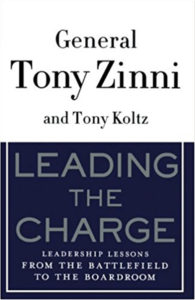
Leading the Charge: Leadership Lessons from the Battlefield to the Boardroom
Tony Zinni &? Tony Koltz
St. Martin’s Griffin (2010)
Rs3,177
“What’s happened to our leaders and to our leadership?” Based on General Zinni’s leadership experiences from the battlefield to the boardroom, Leading the Charge shows a new way through the significant leadership challenges of the 21st century.
The times are changing at an ever-increasing velocity. Old systems, organizations, and ways of operating no longer work in our dynamic, complex and increasingly unstable new environment. Out of this chaos and confusion, a new and different leader must emerge. Old systems and methods will no longer work.
Leading the Charge is a visionary leadership book that examines the trends that have reshaped our world and the ways in which visionary leaders and organizations can effectively respond. Tomorrow’s successful leaders-in all fields, including the military, academia, politics, and business-must know how to create, operate, and thrive in very fluid, flattened, and integrated structures that are remarkably different from the traditional organizations we are used to seeing. They will have to manage rapidly changing technology and flows of information, and create faster and more far-reaching spans of control.
Leading the Charge shows the way, and is an incisive and compelling guide to the new world of leadership, one that will prove indispensable for years to come.
Organized around “Leading a New World,” a revolutionary leadership course General Zinni developed and taught at the Terry Sanford Institute of Public Policy at Duke University, Leading the Charge makes a convincing case that leaders must . . .
- change with the times to be relevant.
- be ready for crisis mode at any given time.
- have a moral compass and the ability to steer the company in the right direction.
- be forward thinking, not reactive, to provide innovation and creativity.
- develop great leaders.
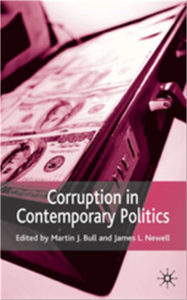
Corruption in Contemporary Politics
Editors: Bull, M., Newell, J.
Palgrave (2003)
Rs8,493
Political corruption has recently emerged as a key area in the study of advanced industrial nations. Not only has it become more visible than in the past, its sheer scale in some countries has had a significant impact on the functioning of their political institutions. Martin Bull and James Newell have assembled a group of experts to address the importance of this phenomenon for contemporary Western democracies - as well as for the new democracies of Eastern Europe, for the European Union and at the international level.
‘...the book clearly reflects two major shifts in perspective that characterize this new strand of literature on corruption...The great strength of this book lies in the wealth of experiences and proposals it offers, making it clear that there are no easy answers for the problems.’ - Liliane Karlinger, Environment and Planning
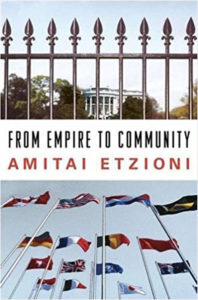
From Empire to Community: A New Approach to International Relations
Amitai Etzioni
St. Martin’s Press (2004)
Rs3,395
Whether one favors the U.S. global projection of force or is horrified by it, the question stands - where do we go from here? What ought to be the new global architecture? Amitai Etzioni follows a third way, drawing on both neoconservative and liberal ideas, in this bold new look at international relations. He argues that a “clash of civilizations” can be avoided and that the new world order need not look like America. Eastern values, including spirituality and moderate Islam, have a legitimate place in the evolving global public philosophy.
Nation-states, Etzioni argues, can no longer attend to rising transnational problems, from SARS to trade in sex slaves to cybercrime. Global civil society does help, but without some kind of global authority, transnational problems will overwhelm us. The building blocks of this new order can be found in the war against terrorism, multilateral attempts at deproliferation, humanitarian interventions and new supranational institutions (e.g., the governance of the Internet). Basic safety, human rights, and global social issues, such as environmental protection, are best solved cooperatively, and Etzioni explores ways of creating global authorities robust enough to handle these issues as he outlines the journey from “empire to community.”
Dr. Amitai Etzioni, after receiving his Ph.D. in Sociology from the University of California, Berkeley in 1958, served as a Professor of Sociology at Columbia University for 20 years; part of that time as the Chairman of the department. He was a guest scholar at the Brookings Institution in 1978 before serving as a Senior Advisor to the White House from 1979-1980.
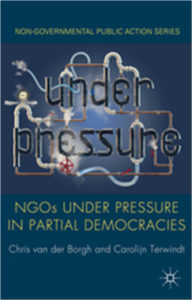
NGOs under Pressure in Partial Democracies
Chris van der Borgh
Palgrave (2014), Rs11,041
Over the past decade, international human rights organizations and think tanks have expressed a growing concern that the space of civil society organizations around the world is under pressure. This book examines the pressures experienced by NGOs in four partial democracies: Guatemala, Honduras, Indonesia and the Philippines.
‘This useful, timely study goes beyond the headline of ‘civil society backlash’ to provide a fine-grained examination of the pressures that civil society organizations are facing in partial democracies. The nuanced analysis sheds light not just on the types of pressures that civil society organizations are facing but why such pressures are arising and how affected organizations are responding to them.’ Thomas Carothers, Carnegie Endowment for International Peace, Washington, DC, USA
‘This book is an indispensable tool for human rights organizations in Mexico. The authors’ analysis offers us an objective perspective on the real violence confronting civil society organizations in different parts of the world and, most importantly, it offers us keys to reveal and expose this violence and respond strategically to the pressures imposed by powerful actors.’ Alejandra Ancheita, Founder and Executive Director of ProDESC (The Project of Economic Cultural and Social Rights), Mexico
‘This convincing and thorough analysis shows that the way civil society organizations are affected by the restrictions varies depending on their areas of work, and therefore the strategies and methods of the organizations to adapt and continue their work vary too. It will be of great interest to other organizations working in a comparable environment.’ Dr Julia Duchrow, Head of the Human Rights and Peace Desk, Bread for the World, Germany.
Chris van der Borgh is an associate professor at the Centre for Conflict Studies, Utrecht University, The Netherlands. Carolijn Terwindt holds a doctorate from Columbia University, USA. She is currently a legal advisor at the European Center for Constitutional and Human Rights in Berlin, Germany.
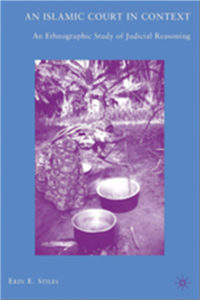
An Islamic Court in Context: An Ethnographic Study of Judicial Reasoning
E. Stiles
Palgrave (2009)
Rs9,342
Stiles utilizes in-depth ethnographic study of judicial reasoning and litigant activity in Islamic family court in Zanzibar, Tanzania to draw new and important conclusions on how people understand and use Islamic legal ideas in marital disputes.
“An Islamic Court in Context contributes new case studies to support established theoretical claims regarding the situated process of Islamic legal reasoning and the importance of attending to gender roles and performance in Islamic family courts . . . Erin Stiles presents some useful points of analysis and observation of the situated meaning of judicial reasoning in an Islamic court, and this reader looks forward to more from Stiles in the future.” - Islamic Africa
“Through richly detailed and beautifully narrated cases Stiles presents a deeply humanistic account of a contemporary Islamic legal system. Concentrating on Zanzibar, she demonstrates how women in particular navigate a religiously affiliated system, and in the process she brings an entire society to life. With her insightful interpretation of a legal environment that governs one-fifth of the planet and about which Westerners continue to possess far too simplistic a view she makes a signal contribution to the literature.” - Lawrence Rosen, Cromwell
Professor of Anthropology, Princeton University, USA, and author of Varieties of Muslim Experience
“Stiles provides one of the few in-depth looks at how a contemporary Islamic judge deals with divorce. She describes in vivid detail how women and men negotiate in a Zanzibar court, and the way an ordinary judge must draw on his study of the Qur’an, his knowledge of state law, and his keen sense of the complexities of social life to resolve often bitter disputes. This book is at once a major work in legal anthropology and a rich example of the very best in social studies of contemporary Islam.” - John R. Bowen, Dunbar-Van Cleve Professor in Arts and Sciences, Washington University in St. Louis, USA
Erin E. Stiles is Assistant Professor of Anthropology at California State University, USA.

